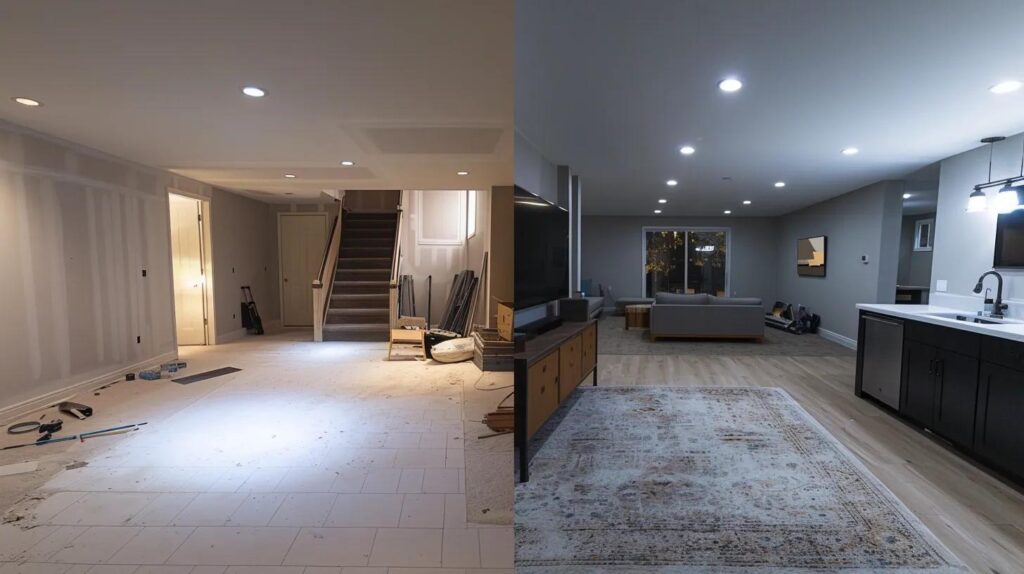
DIY vs. Professional Contractor: Key Differences in Basement Finishing for Des Moines Homeowners
basement finishing des moines has the potential to transform an unused space into a functional living area. Des Moines homeowners face a choice between a DIY approach and hiring a professional contractor. This article compares the advantages and disadvantages, cost implications, time requirements, quality, and code compliance of each option while explaining how local building codes and permits impact the process.
Key Takeaways
- DIY basement finishing offers cost savings and creative control but requires significant personal skill, tools, and time.
- Professional contractors provide expertise, quality assurance, and local code compliance, reducing stress and saving time.
- Costs include not only materials and labor but also permit fees and hidden expenses that vary by method.
- DIY projects can take longer due to unforeseen challenges, while professionals typically complete projects faster.
- Homeowners must evaluate their skills, budget, and the complexity of local codes before deciding on a method.
What Are the Main Advantages and Disadvantages of DIY Basement Finishing?
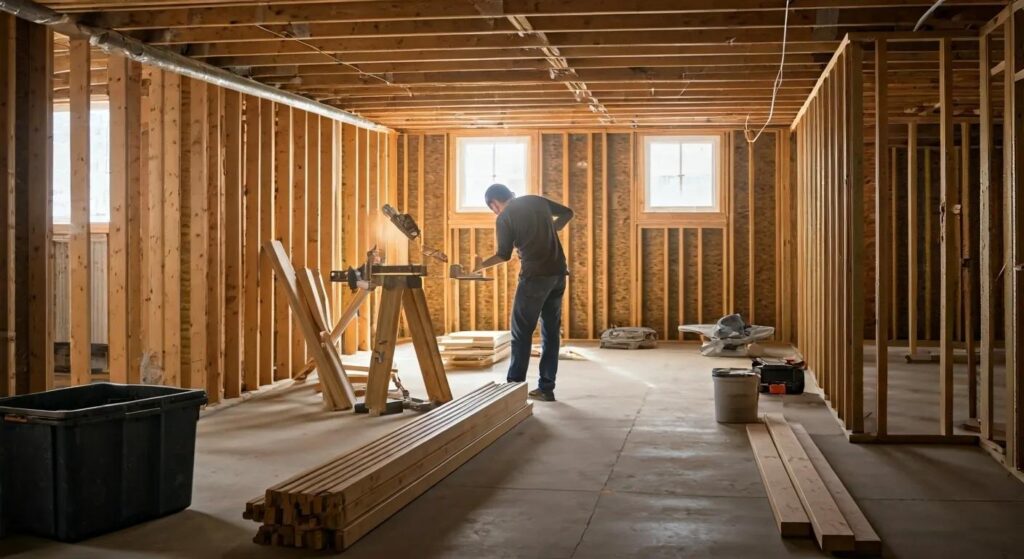
DIY basement finishing gives homeowners hands-on control, allowing them to work at their own pace and customize designs. It can lower labor costs if one is skilled in carpentry, plumbing, and electrical work. However, DIY projects require a wide array of skills and tools and involve a significant time commitment. Mistakes can lead to costly repairs or safety hazards, and in
, non-compliance with local building codes is a serious risk without professional oversight.
What Skills and Tools Are Required for DIY Basement Finishing?
Successful DIY finishing calls for technical skills in carpentry, basic electrical work, plumbing, and drywall installation. Essential tools include power saws, drills, levels, and measuring tapes. Homeowners must also be able to read blueprints and understand building codes to ensure that the work adheres to safety and legal standards.
How Does DIY Basement Finishing Impact Cost and Budget?
While DIY projects reduce labor costs, homeowners still must pay for materials, tools, and rentals. Hidden expenses may arise from delays or mistakes requiring professional correction. The control over spending and design is attractive, but one must carefully assess if the savings outweigh the potential risks and extra time needed.
What Are the Time Commitments and Challenges of DIY Projects?
DIY projects can extend over several months due to underestimating task duration, unexpected issues like moisture or uneven surfaces, and interruptions from personal schedules. Thorough planning, waiting for finishes to dry, and managing safety standards can further increase the timeline, making time management one of the biggest challenges.
What Risks Are Associated With DIY Basement Finishing in Des Moines?
In Des Moines, risks include non-compliance with building codes and construction errors that lead to improper insulation, waterproofing, or structural modifications. Such mistakes can result in long-term issues like mold, leaks, and foundation damage. Inexperienced DIYers may also struggle with permit acquisition, potentially incurring fines or complications during property resale.
Why Should Des Moines Homeowners Consider Hiring a Professional Contractor for Basement Finishing?
Professional contractors bring specialized skills and years of experience that minimize the risks of basement finishing projects. They ensure adherence to local building codes and safety standards while handling the complexities of design, permits, and unforeseen challenges efficiently. Hiring a contractor often leads to higher quality results with less stress and a faster turnaround time.
What Expertise and Services Do Professional Contractors Provide?
Contractors offer a full range of services including initial consultation, design planning, permit acquisition, and complete construction. They manage installations of flooring, insulation, electrical, and plumbing systems while paying attention to interior design elements. Their access to advanced tools and reliable subcontractors helps avoid common DIY pitfalls.
How Do Professionals Ensure Quality and Code Compliance?
Professionals are well-versed in Des Moines building codes, ensuring that every aspect of the project complies with local regulations. They secure the necessary permits, schedule inspections, and use certified materials. Regular progress evaluations and standardized work processes contribute to a safe, energy-efficient, and durable finished basement.
How Does Hiring a Contractor Save Time and Reduce Stress?
By delegating planning, scheduling, and troubleshooting to professionals, homeowners experience less disruption to their daily lives. Contractors coordinate all aspects of the work, enabling a faster project completion and reducing the potential for costly delays or errors. This efficiency leads to quicker use of the renovated space and overall improved satisfaction.
What Are the Long-Term Benefits of Professional Basement Finishing?
Professional finishing can enhance home value, energy efficiency, and overall living conditions. A finished basement can serve various functions—a family room, home theater, or extra living area—boosting your property’s marketability. With quality workmanship and warranties for added protection, the investment helps prevent issues like moisture damage, mold, or structural deterioration.
How Do DIY and Professional Basement Finishing Compare in Cost for Des Moines Homeowners?
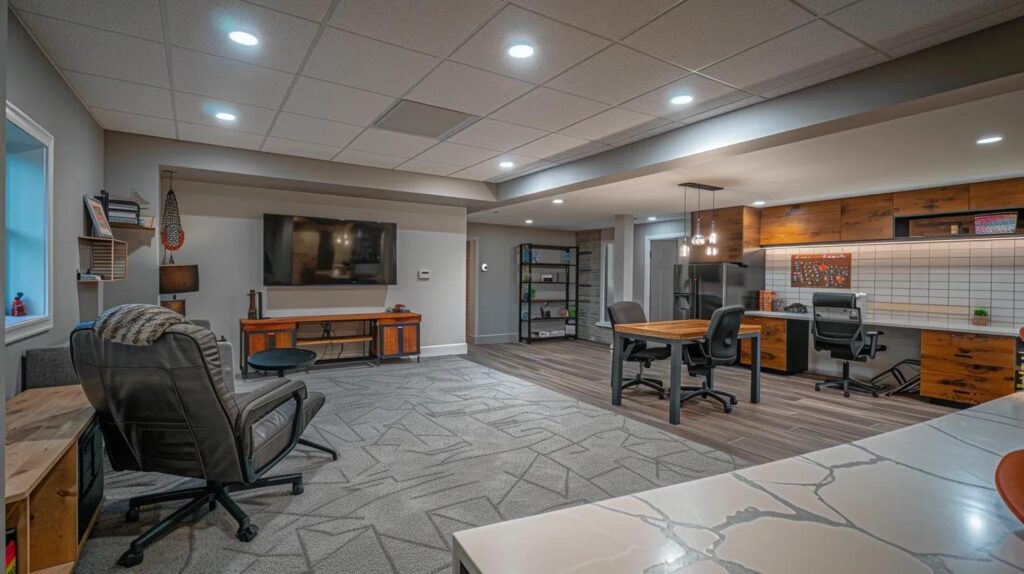
Although DIY can reduce labor expenditures, it demands a high time investment and carries risks that might lead to additional costs. Professional contractors charge for their expertise and project management, but their reliable service often minimizes potential errors and subsequent repair costs, balancing the overall expense.
What Are the Typical Material and Labor Costs for DIY vs. Professional?
Material costs are similar for both methods, but labor is the major variable. DIY saves on labor if the homeowner is efficient, whereas professionals charge labor based on market rates in Des Moines. Contractors may also secure better deals on materials due to established supplier relationships, potentially offsetting higher labor expenses.
How Do Permit Fees and Hidden Expenses Affect Overall Costs?
Permit fees and hidden costs such as corrective measures or additional materials can add up. DIY homeowners risk unforeseen expenses if permit procedures are not properly followed, while professionals incorporate these fees into their estimates, resulting in a more predictable and controlled overall cost.
Can Hiring a Professional Contractor Offer Better Value for Money?
Yes, investing in a professional often proves more cost-effective in the long run. Quality workmanship, adherence to codes, and faster project delivery can enhance long-term home value and reduce future repair costs. The warranties and post-project support offered by professionals further add value that DIY projects may lack.
What Financing Options Are Available for Professional Basement Finishing?
Many Des Moines homeowners benefit from financing options such as home improvement loans or lines of credit. Contractors may offer flexible payment plans or partner with financial institutions, making it easier to invest in quality finishing work without an immediate large cash outlay.
How Does the Time Required for DIY Basement Finishing Compare to Hiring Professionals?
DIY finishing can extend over several months due to skill limitations and scheduling conflicts, whereas professional contractors complete projects typically within four to eight weeks. Faster project completion means less disruption for homeowners and quicker access to the finished space.
What Is the Average Project Timeline for DIY Basement Finishing?
Depending on skill and scope, DIY projects may take several weeks up to six months. Homeowners often work in fits and starts around other commitments, and unexpected issues may further delay progress.
How Quickly Can Professional Contractors Complete Basement Finishing?
Professionals in Des Moines usually finish a basement in four to eight weeks thanks to experienced crews, efficient planning, and continuous work. This rapid turnaround minimizes inconvenience and accelerates the return on investment.
What Factors Influence Project Duration for Both DIY and Professionals?
Project duration is influenced by the design complexity, size of the space, number of structural or plumbing modifications, and material availability. Weather and required drying or curing times also affect timelines. For DIY projects, personal skills and time management are crucial; for professionals, established workflows support timely completion.
What Are the Key Differences in Quality and Code Compliance Between DIY and Professional Basement Finishing?
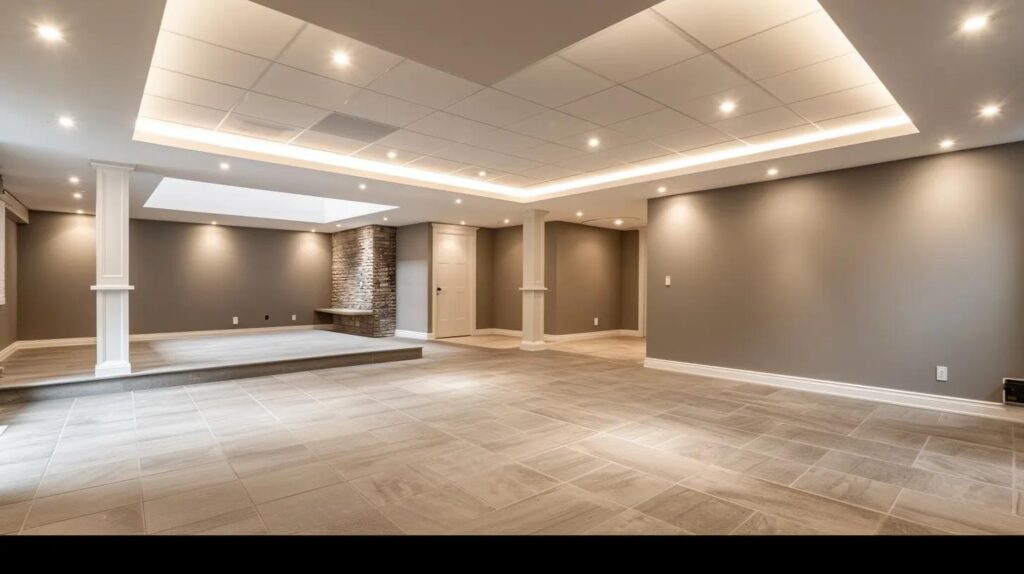
Quality and code compliance are essential in basement finishing. While DIY can yield impressive results, it involves a higher risk of mistakes or code violations. In contrast, professional work is regularly inspected and adheres strictly to local building codes, ensuring a safer, well-finished basement.
How Do Professionals Ensure Adherence to Des Moines Building Codes?
Contractors obtain all necessary permits and schedule inspections at key milestones. Their familiarity with local codes and use of certified materials reduce the risk of violations and future legal or safety issues.
What Quality Risks Do DIY Projects Face Without Professional Oversight?
Without expert oversight, DIY projects may suffer from errors in electrical wiring, plumbing, or structural modifications. Even small miscalculations can lead to water seepage, mold growth, or compromised structural integrity, ultimately reducing the home’s value and increasing repair costs.
How Does Code Compliance Affect Homeowner Liability and Insurance?
Non-compliant work can lead to fines and increased liability in accidents. Insurance claims may be denied if work fails inspections, leaving homeowners exposed to further expenses. Professional projects backed by permits and warranties offer better protection in these areas.
What Should Des Moines Homeowners Consider When Choosing Between DIY and Professional Basement Finishing?
Choosing the right approach depends on individual skills, available time, budget, and project complexity. While DIY offers creative control and potential cost savings, hiring a professional minimizes risks and ensures compliance with local building codes.
How Do Personal Skills and Experience Influence the Choice?
Homeowners with substantial experience in home improvement may prefer DIY, while those less familiar with construction processes face higher risks of errors and delays. An honest assessment of one’s abilities is essential.
When Is Hiring a Professional Contractor the Better Option?
For projects involving structural modifications, extensive electrical or plumbing work, or when quick completion is needed, professional contractors are preferable. Their expertise is invaluable when local building codes are strict and when quality and safety cannot be compromised.
How Can Homeowners Find Reliable Basement Finishing Contractors in Des Moines?
Homeowners can seek recommendations through local trade associations, online reviews, and referrals from trusted sources. Obtaining multiple quotes and checking credentials such as licensing and insurance helps ensure a reliable contractor.
How Do Local Des Moines Building Codes and Permits Impact DIY and Professional Basement Finishing?
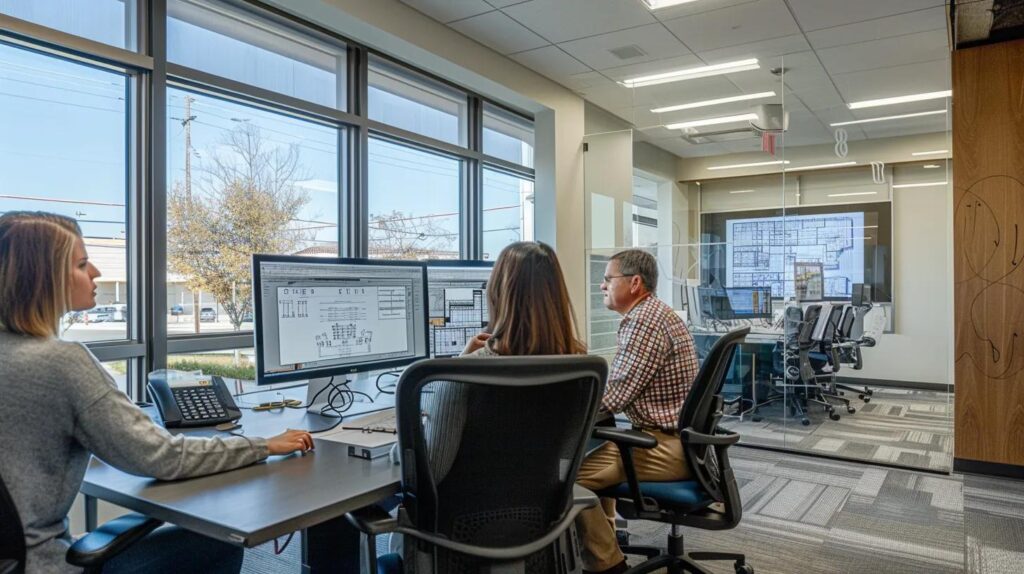
Local building codes ensure safety and structural integrity. Both DIY and professional projects must comply with these standards, but professionals are typically more efficient at securing permits and managing inspections, which helps avoid fines and complications.
What Permits Are Required for Basement Finishing in Des Moines?
Typically, projects require building, electrical, and plumbing permits. These permits verify that modifications such as insulation, wiring, and moisture control meet local codes, protecting both safety and property value.
How Do Professionals Handle Permits Differently Than DIY Homeowners?
Professionals integrate permit applications into their project planning, reducing delays and minimizing the risk of errors in paperwork. DIY homeowners may face significant bureaucratic hurdles if unfamiliar with the process.
What Are the Consequences of Non-Compliance With Local Codes?
Non-compliance can result in fines, the need to redo certain projects, and potential insurance issues. It also jeopardizes the home’s resale value. Ensuring strict adherence to local codes is critical regardless of the finishing method.
Frequently Asked Questions
Q: What is the biggest cost factor when finishing a basement? A: Labor and the complexity of meeting building codes are major cost drivers, whether the work is done DIY or by professionals.
Q: How can I ensure my DIY project meets Des Moines building codes? A: Review local regulations, attend permitting workshops, and consider hiring a consultant to inspect the work.
Q: Are warranties available for professionally finished basements? A: Yes, many contractors provide warranties on both workmanship and materials.
Q: What financing options do contractors offer for basement finishing? A: Contractors often work with financial institutions to offer home improvement loans or flexible payment plans.
Q: How do I choose between DIY and professional basement finishing? A: Consider your skill level, available time, project complexity, local building codes, and overall budget.
Final Thoughts
Professional basement finishing delivers quality, safety, and code compliance that DIY projects may struggle to achieve. Des Moines homeowners should carefully assess their skills and the scope of their project before deciding. When safety, time, and long-term home value are paramount, hiring a professional contractor is often the best investment. Regardless of the approach, strict adherence to local building codes and thoughtful planning are essential for a successful basement remodel.






